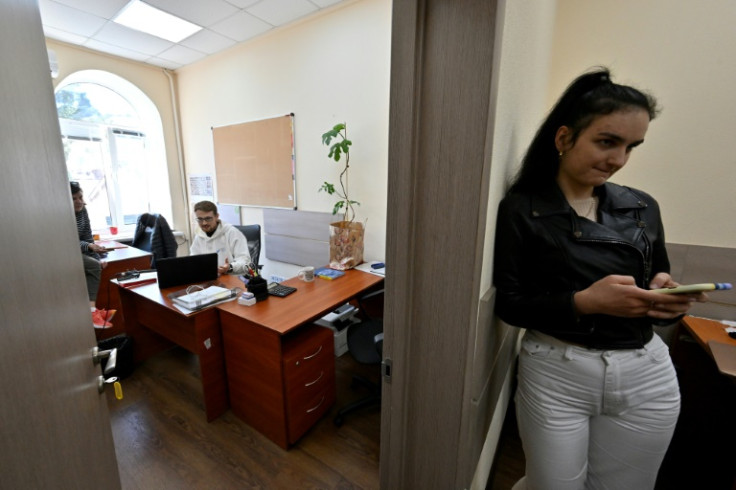Ukraine's First Nobel Peace Prize Winners 'Astonished'

The Kyiv-based Center for Civil Liberties has run successful campaigns for political prisoners, tracked enforced disappearances and focused on Russian war crimes, but they did not see a Nobel Peace prize coming.
The NGO became the winner of Ukraine's first ever peace prize on Friday, sharing the award with Belarusian and Russian co-winners.
The Norwegian Nobel committee announcement sparked surprise and joy at the centre.
"When we found out the news, we were astonished," CCL's Anna Trushova told AFP.
Set up in 2007, the group is led by rights defender Oleksandra Matviychuk, a lawyer who turns 38 on Saturday.
"It is above all a reward for Oleksandra (who) gathers around her incredible people and does immense work in the field of human rights," CCL board member Alissa Malytska told AFP.
Matviychuk, who was on her way from Poland to Ukraine when she heard the news, said in a Facebook message she was "delighted".
"We need to create an international tribunal and bring Putin, Lukashenko and other war criminals to justice," she added, referring to the autocratic presidents of Russia and Belarus.
CCL gained prominence after 2014 by mounting awareness campaigns around Ukrainian political prisoners and prisoners in Russian-occupied parts of Ukraine -- including the Crimean Peninsula, annexed by Russia in 2014, and the eastern Donbas region -- as well as in Russia itself.
CCL's best known prisoner campaign was for the filmmaker Oleg Sentsov. He directed "Rhino", which was screened at the 2021 Venice film festival.
Arrested in Crimea after protesting against its annexation, Senstov spent five years in jail in Russia before being released in 2019 during a prisoner exchange between Ukraine and Russia.
"It was (Matviychuk's) idea" to launch an international 'SaveSentsov' campaign, Olexander Starodubtsev, deputy head of Ukraine's national anti-corruption agency, told AFP.
"Lessia is very powerful and confident in what she does," said Starodubtsev, who studied with Matviychuk at the American University of Stanford five years ago.
"Her life is devoted to her mission. When we were studying in the United States, she was also busy at night" with human rights projects, he said.
A motto posted on her Facebook page appears to support his words: "Pessimism is a luxury you cannot afford. When your strength leaves you, your character emerges."
CCL also tracks the enforced disappearances of rights activists, journalists and local council officials.
Since Russia invaded Ukraine in February, the center has also worked to identify and document Russian war crimes against the civilian population in Ukraine.
Relying on the help of volunteers, the NGO sent groups to suspected crime scenes. It also worked to facilitate the return to Ukraine of "tens of thousands" of compatriots who were forcibly taken from the war zone to Russia.
"We have already recorded more than 20,000 crimes," Trushova told AFP.
The 2022 Peace Prize was also awarded to Belarusian human rights advocate Ales Bialiatski and Russian human rights group Memorial.
The peace prize laureates "represent civil society in their countries" said the Nobel committee.
But the award did not meet with universal acclaim in Ukraine, which was invaded in February from Russian and Belarusian territory.
"Very bad idea (...) but very typical for the West", Olga Roudenko, editor-in-chief of the English news site Kyiv Independent, commented on Facebook.
"We still have to work a lot so that we are seen as a separate phenomenon and not just part of the region with Russia and Belarus," she said.
© Copyright AFP 2024. All rights reserved.





















